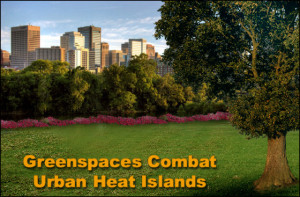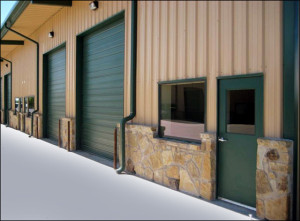Beating Summer Heat with Greenspaces in the Cities
In previous blogs we covered some of the many problems an urban heat island (UHI) inflicts on city-dwelling people, our planet, and our pocketbooks. Now let’s look at the ways we can mitigate the effects of UHIs on our cities.
We Must Combat Urban Heat Islands Matters NOW
 Today 80% of all Americans live in cities. Millions more commute to cities daily for employment. UHIs affect the comfort, health, and finances of all these Americans every summer.
Today 80% of all Americans live in cities. Millions more commute to cities daily for employment. UHIs affect the comfort, health, and finances of all these Americans every summer.
Urban heat islands change the environment. When our environment suffers, we suffer. The climate changes wrought by the actions of mankind affect everything and everyone on the planet. Deteriorating air quality and rising temperatures cannot continue unabated.
So what can we do to reduce the effects of urban heat islands?
When a Tree Grows in Brooklyn— and Other Urban Heat Islands
By scraping the landscape completely clean to make room for urban development, we have sacrificed the best way of mitigating urban heat island effects: vegetation.
We need more greenspaces in the cities— a LOT more.
Trees, plants, and grass should be planted everywhere possible in urban areas, including parks, yards, around businesses and buildings, along city streets and highways, parking lots— even on rooftops. Here’s why:
- Trees not only provide shade to cool hot pavement, but they are also the best defense against air pollution.
- Plants and trees retain moisture and create an evaporate affect that cools surrounding air. According to the Environmental Protection Agency (EPA), evapotranspiration provided by vegetation may reduce peak summer temperatures by as much as 9°F.
- Trees can drop surface temperatures as much as 45°F.
- Lower temperatures mean lower energy usage, which in turn decreases the amount of pollutants discharged into the air.
- Strategically planted trees can lower summer air conditioning bills by up to 20%. Even a single, well-placed, mature tree cuts energy costs by 2% or more.
- Trees and plants absorb carbon dioxide, ozone emissions, and other noxious contaminants from the air. In exchange, trees and vegetation release fresh oxygen back into the air through photosynthesis.
- One large, healthy, mature tree absorbs as much as 300 pounds of carbon dioxide in a year. It also releases enough life-giving oxygen to support two people for a year.
- The top surface of tree leaves captures air-borne particulates from the air, also improving air quality.
- Urban tree plantings reap great financial rewards. A study directed by Fort Collins, Colorado, estimated that every dollar spent on planting urban-placed trees could yield a $2.18 return on investment.
- Studies have shown that contact with nature improves mental health. People dwelling in concrete-and-glass metropolises need nearby gardens or parks in which to walk, jog, or just unwind.
- Deciduous trees generally work best in urban areas. The tree’s leaves provide shade in the summer, but bare trees do not block the suns heat in the winter. Trees indigenous to the area generally prove hardier.
- Trees improve air quality and reduce city noise levels. Trees also enhance the overall look of a property, increasing property values. The Center for Urban Research claims tree-covered properties sell for 5% to 15% more than comparable properties without trees.
- Green roofs— those covered with gardens or other vegetation— also decrease urban heat island effects.
More Solutions to Come…
 The fastest, easiest, and most economical way to mitigate UHIs is to increase greenspace in the urban area. However, there are other ways to tame the summer heat beast known as the urban heat island. Our next blog will cover some of those solutions.
The fastest, easiest, and most economical way to mitigate UHIs is to increase greenspace in the urban area. However, there are other ways to tame the summer heat beast known as the urban heat island. Our next blog will cover some of those solutions.
One way of mitigating the effects of UHIs is to build responsibly in the first place.
We invite you to call RHINO Steel Building Systems to discuss our innovative green metal buildings. We offer multiple ways to protect your investment— and reduce operating costs— with energy-efficient building options.
Call RHINO today to discuss your next building project. Our experienced and friendly steel building specialists will answer your questions, help with suggestions, and provide you with a free, no obligation quote.
Call the RHINO number now at 940.383.9566.
